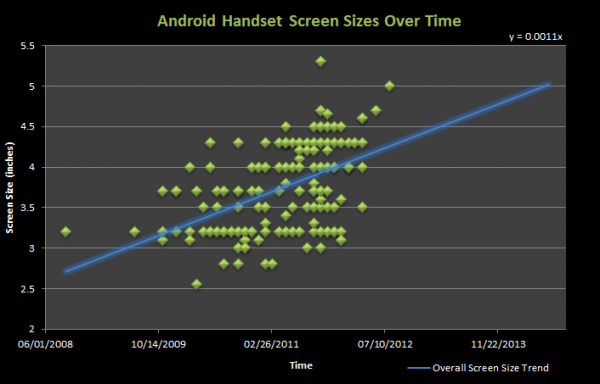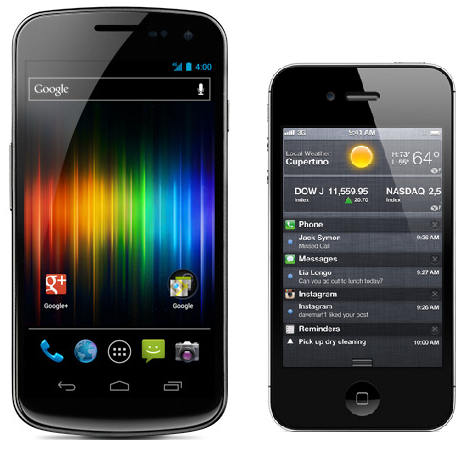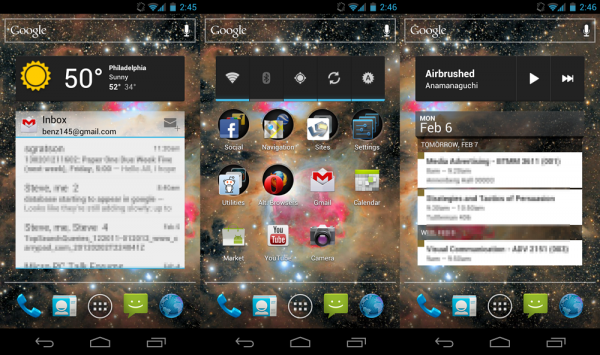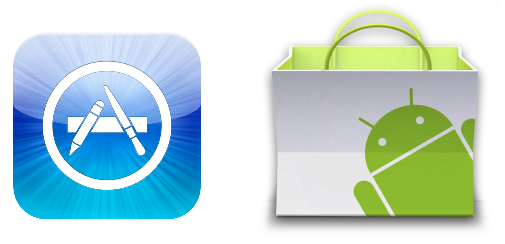I’ve been using the iPhone for three generations now — starting with the iPhone 3G, then the iPhone 3GS, and finally the iPhone 4 which is my current companion. I’m finally due for an upgrade and I must say that I’ve come closer than ever before to picking an Android phone (specifically the Galaxy Nexus) over an iPhone, but it just wasn’t meant to be and I’ll explain why. Be sure to note that what’s important to have in a phone for me might not be the same for you; I’m just laying out my thoughts here as to why the Galaxy Nexus has been the phone that has come the closest to tempting me over to Android.
Android 4.0
 Android 4.0 Ice Cream Sandwich feels like the first truly full package in the history of Android. Finally there’s good hardware acceleration and enough performance for a nearly smooth home screen. This hasn’t quite translated over to all apps just yet. Android finally seems to have all of the vital default apps and has long included a turn-by-turn navigation app that blows Apple’s Maps app out of the water. Google just launched the Chrome Beta browser which offers a rich browsing experience which should have been included in Android long ago. Photos can now be robustly edited right in the gallery without scouring the Android Market for the right app. Home screen folders are extremely fast and a pleasure to use, while resizable widgets further the level of flexibility and customization. There’s better battery and data analysis, and much more. This has all come together in bits and pieces over the last few years as Android has grown, and 4.0 is the first time it feels like a complete package to me.
Android 4.0 Ice Cream Sandwich feels like the first truly full package in the history of Android. Finally there’s good hardware acceleration and enough performance for a nearly smooth home screen. This hasn’t quite translated over to all apps just yet. Android finally seems to have all of the vital default apps and has long included a turn-by-turn navigation app that blows Apple’s Maps app out of the water. Google just launched the Chrome Beta browser which offers a rich browsing experience which should have been included in Android long ago. Photos can now be robustly edited right in the gallery without scouring the Android Market for the right app. Home screen folders are extremely fast and a pleasure to use, while resizable widgets further the level of flexibility and customization. There’s better battery and data analysis, and much more. This has all come together in bits and pieces over the last few years as Android has grown, and 4.0 is the first time it feels like a complete package to me.
The saddest part about all of this is how hard it is to get your hands on Android 4.0 Ice Cream Sandwich. Google has crafted this seemingly complete package, but less than 1% of users have access to it right now! I’m actually limited to the Galaxy Nexus if I want a top-end phone that also runs Android 4.0 at the moment.
Camera
 The camera app in Android 4.0 is super fast in both launching and taking consecutive photos. Unfortunately, I still find that all Android handsets that I’ve tested have lacked in camera quality (for both stills and video) when compared to the iPhone 4, often despite higher megapixel ratings. For me, camera quality is more important than speed. The new panorama mode in the Android 4.0 camera app is neat, but I find that I can achieve better results by taking individual photos, then stitching them together on the computer. It’s a shame that Nokia never got into the Android ecosystem as they’ve long been heralded as having some of the best optics in the mobile industry.
The camera app in Android 4.0 is super fast in both launching and taking consecutive photos. Unfortunately, I still find that all Android handsets that I’ve tested have lacked in camera quality (for both stills and video) when compared to the iPhone 4, often despite higher megapixel ratings. For me, camera quality is more important than speed. The new panorama mode in the Android 4.0 camera app is neat, but I find that I can achieve better results by taking individual photos, then stitching them together on the computer. It’s a shame that Nokia never got into the Android ecosystem as they’ve long been heralded as having some of the best optics in the mobile industry.
The iPhone 4S camera is supposed to be even better than the iPhone 4 camera with 8MP instead of 5MP and reworked optics. If I can achieve photos like the following with the iPhone 4, then I’m looking forward to what the iPhone 4S has to offer:
Notification System
I’ve said it before and I think it’s still true today: Android is the best at managing notifications, while iOS is the best at delivering them. Between Android 4.0 and iOS 5.0, Android absolutely wins when it comes to managing notifications — you can toss away individual notifications or dismiss them all at once if you’d like. Tapping on a notification takes you directly to the item you are being notified about. All of this is better than how iOS does it. However, Apple’s push notification system is best in class. I don’t understand why Google doesn’t have push Gmail through the official Gmail app. Side-by-side with the Galaxy Nexus, my iPhone 4 shows changes to my inbox almost instantly, while the Galaxy Nexus doesn’t do anything until significantly later, unless manually refreshed. I can literally receive, respond to, and be done with an email on my iPhone 4 before it even arrives on the Galaxy Nexus. For some people, getting notifications instantly isn’t a big deal, but as someone who works on the web it’s a big advantage and one that I can’t easily give up.
Screen Size

If you follow Carrypad regularly, you’ll know that I’ve got some gripes with 4″+ screens. One-handed usability is important to me because I’m frequently on the go. The 3.5″ screen of the iPhone (all versions of it) is far more comfortable in my hand than anything 4″ and above. The Galaxy Nexus, at 4.65″, is just too big to be used comfortably in one hand for me. Everyone’s hands are different sizes, so everyone has a different limit, but with the massive-screen fad that’s been growing in Android over the years, it’s almost impossible to get a top-end Android phone in a size less than 4″. If the Galaxy Nexus came in any size 4″ or less, I’d be far more inclined to pick it over the iPhone 4S.
Customization
This is one of Android’s greatest strengths, but it always runs the risk of being over-complicated. I’m the kind of person who loves to tinker with their gadgets and get them to work just the way I’d like. On the iPhone, this urge is satisfied with jailbreaking, which enhances the customizations you can make on iOS, but it’s not much compared to what you can do on Android. With Android 4.0 on the Galaxy Nexus, I can fit tons of apps efficiently on one page with folders. On other screens, I’ve got at-a-glance access to my calendar, weather, inbox, and music player. It’s nice to be able to do much of what I need to right from the homescreen instead of jumping through hoops between apps. This category is a major win for the Galaxy Nexus.
Apps
There’s no denying that there are some great apps on Android, but Apple’s iOS App Store still has a greater number of apps than the Android Market. When we’re talking about hundreds of thousands of apps in each store, the aggregate hardly matters. Where iOS has the real advantage is in quality and consistency. Because Apple has strict guidelines, most apps are intuitive and work well without crashing. When it comes to apps from the Android Market, you might have two great apps, but they might have two completely different interface approaches — one app trying to emulate an iOS-like ‘everything on screen’ style and the other trying to do the Android thing by hiding features away in long-presses and hidden menus. Alone, each of these is arguably as good as the other, but when you have to jump between apps that go back in forth in their interface approach, the user interaction aspect of it becomes increasingly convoluted, and this is something I quite dislike.
Availability
If everything above held an advantage for the Galaxy Nexus, there would still be one huge issue for me choosing it over the iPhone 4S — availability. I’m on AT&T, and the Galaxy Nexus is decidedly not available for purchase. AT&T has not one Android 4.0 ICS phone available at the moment, which means the best I could do is buy one of the top-end Android phones then wait and hope that it would receive an ICS upgrade. If Google thinks the Galaxy Nexus and Android 4.0 is such a great pair, they’ve got to do a better job of making it available for people to actually purchase it. The only way for me to actually get my hands on the Galaxy Nexus would be to switch carriers or buy an expensive unlocked version of the phone without a subsidy from my carrier.
So, Google, you almost had me on this one, but unfortunately I’ve made up my mind to continue with the iPhone — for now anyway. Fix the stuff above that needs it; you’ve got two years to work on it before there’s another chance to convert me.















yes, the needs you look for are yours and only yours. but while you expose them to the public, obviously you want to get a response to those decisions. so asking for, or begging people not to start a fan-boy discussion is rather ridiculous.
you describe a whole lot of good things about android but make it look bad with some stats that have nothing to do with the os itself. why don’t you start talking about the things that ios is NOT able to do compared to android? you simply can’t make an objective evaluation if you already know what is important to you.
it’s very difficult to say what is better. even i can’t say it because i already chose android. so whatever apple comes up with, they are and will always be crap as they don’t meet my needs…and thus the discussions start again :-)
I’m not looking to achieve a definitive objective answer of which OS is better because as we both concluded, there isn’t one answer that fits everyone. This was sort of an expose of the thoughts floating around in my head which led me to the decision. Other people may find this article when making their own choice and weigh the factors I listed above differently and may decide that Android is better for them, even when just using the information I provided.
I gave a few of the reasons why the Galaxy Nexus tempted me, and a few which are why I have ultimately decided to stick with iOS for another contract-cycle (those things being mostly camera, phone size, app quality, push notifications, and availability). I’m happy to receive responses such as yours to discuss these various factors, and I think that can be accomplished without fanboyism.
Why I dont choose an iphone 4.
1. No gorilla glass. This can be seen as an absolute con, that the most expensive phone on the market does not provide what has become commonplace on top tier android handsets. I cant count how many iphones ive seen disfigured due to a lack of this basic and easily rectified problem.
2. Lack of removable battery. Yeah, you are probably near a charger all the time , but face it sometimes you have to go places in just your jeans and tshirt, in such times a spare battery can save a lot of anxiety. This , and just being able to pop back home , switch out the battery and be on your way is, for a phone , an indispensable and, gosh darn it, a basic right.
3. The screen is way too small on an iphone. Its a pocket computer now ,times change , uses change but the iphone is stuck in 2008 in this regard.
4. The rent is too damn high!. My gs2, at launch was cheaper than the year old iphone 4. This while besting it in a lot of areas.
5. Personal preference but I find the iphone bulky and heavy compared.to the gs2, I prefer no metal on my phone. I’ve dropped the gs2 countless times and have only minor scratches to the plastic. This feeds into the durability area becayse my gs2 seems to just bounce of the ground wheras the iphone , with all the metal, meets it less gracfully.
these are basic, bread and butter things. the iphone might have a slightly better camera , and the gs2 might have fancy widgets, the iphone might have a simpler design and more apps and the gs2 might or might not have a better os. These things are all debatable but when it comes to the basics the gs2 wins before I even turn the phone on.
Jack, the iPhone has been using Gorilla Glass since the first iPhone. Corning (the makers of Gorilla Glass) won’t say so because of their agreement with Apple.
I understand the concern of battery life and a non-removable battery. Apple has made a strong case for non-removable batteries as they can save space to fit a larger battery if they don’t need to support the housing and mechanisms for a removable battery. The iPhone has had best-in-class battery life for quite some time (though the Droid Razor Maxx now surpasses it as far as I know). Still, Apple has shown that they can provide all-day battery life for most users with smart power management and software design. There’s only about two things you can do on the iPhone to destroy battery life – streaming music and GPS. On an Android phone, there are more than I can count on my two hands. For the average user, preventing runaway battery on an Android phone can be a mysterious thing.
If the iphone uses gorilla glass (and thats a big if ) they must be using some cheaper version or using another glass completely, more than likely to have the screen break so people return to apple for a fix or upgrade to another one. I cant think of any other reason a design flaw could survive so long. Frankly, either way i’m disgusted at this.
The battery housing arguement is frankly ridiculous when you place a gs2 next to the iphone. Again, this smacks of plannned obselecence, unless apple is using some super secret battery tech that doesnt degrade over time.
That long lasting battery comes by way of limiting the user. With it your iphone may last an hour or two longer and then you are looking for a charging port.
I dont see how taking away such a vital thing as a changable battery can be soothed away by giving you a little extra juice per day, especially when batteries degrade with each charge and your year old iphone is then carrying less charge than my year old sgs2 because I have 4 batteries rotating duties.
Well, as mentioned, I’ve been using the iPhone since the 3G. Through the 3G, 3GS, and iPhone 4, I’ve never had issues with the battery because Apple ensures that the phones don’t get sold unless they have reasonable all day battery life, and I don’t have to purchase a new battery or carry a replacement on me. With the rate that people are upgrading their phones these days (every two years generally), the battery doesn’t deplete to the point that it becomes a problem; at least, that’s my experience with Apple’s phones.
Too many early 4G LTE phones were launched with pathetic battery life that didn’t even come close to making it through the day — requiring that users buy an extra battery and carry it around with them if they want to use the phone for a reasonable amount of time.